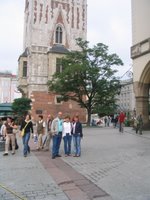
Last week we said goodbye to my parents. They spent two weeks with us, traveling, sightseeing and seeing Donetsk, Makeevka and DCU.
We started the trip by meeting in Warsaw, Poland, and immediately took the train to Krakow, where we spent several days taking in the sights of Krakow’s historic Old Town. We also visited the WWII Nazi concentration camp, Auschwitz-Birkenau, not far from Krakow. We haven’t spent much time in Eastern Europe beyond the Ukrainian borders, so it was interesting to see another Eastern European country, and enjoyed the variety and change of pace from Ukraine. Poland joined the EU not long ago, and is significantly ahead of Ukraine economically, at least in the areas we visited. We enjoyed the comforts of produced by Poland’s economic stability, without having to pay Western European prices – a nice combination.
After Krakow, an overnight train took us across the border to Lvov, Ukraine, in search of some remnants of our Mennonite heritage there. We ended up touring the village of Odinoke, formerly inhabited by Mennonites in the 1800s. Lvov is famed for its beautiful buildings and variety of architecture, and we took in some of that on the one day that it didn’t rain.
Mom and Dad got a true taste of train travel, Ukranian-style, on the 25-hour ride from Lvov to Donetsk, the last three without air conditioning on a hot afternoon. We then spent several swelteringly hot days in Donetsk,
showing my parents the city, our work, friends, church, etc. The rest of the time we sat inside, in front of the fans, drinking black currant juice (Dad’s new favorite).
For the last part of our trip we headed to Kiev and saw the main sights there, including Orthodox churches and the long and winding cobblestone street, Andrevsky Spust, which satisfied our souvenir needs. While in Kiev we discovered Puzata Hata, (which means “fat house” in Ukrainian) a cafeteria-style Ukrainian restaurant, the best way to try as many different kinds of Ukrainian cuisine as you can eat, all in one meal. Dave and I returned to sample more the day Mom and Dad left. The name is appropriate, because if you ate there too often, I’m afraid you would become as fat as a house.
So now we’re back in Donetsk and getting ready for the school year. It’s the season of meetings, so they takes a lot of my time, but my classes don’t start until Sept. 9, so summer’s not quite over quite yet!
PHOTOS: In Krakow's main square, Dave and Dad with a Mennonite-built village well near Lvov

